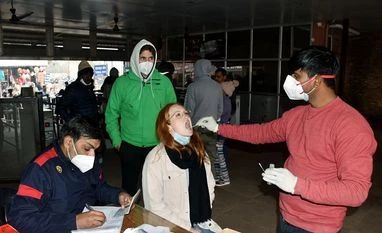As Delhi witnesses a sudden spurt in Covid cases, experts have stressed that there is no need to panic over the absolute numbers and the focus should be on protecting the vulnerable population, especially those who are immunocompromised or have comorbidities.
They have also advised people to remain cautious by masking up and avoiding public gatherings.
Delhi recorded 416 fresh Covid cases on Saturday, the highest in over seven months, with a positivity rate of 14.37 per cent, according to data shared by the city health department. While the government did not issue a bulletin on Friday, the numbers on Thursday stood at 295 while the positivity rate was at 12.48 per cent.
Dr Chandrakant Lahariya, an epidemiologist and public health specialist, told PTI, "There is a clear dissociation between infection and disease. It means that people are testing positive but they do not have symptoms. There is increased testing for flu so there is targeted testing and hence an increase in cases.
"Since there is a surge, patients admitted (for other ailments) are being tested and they are turning out to be Covid positive."
He explained that since the variant XBB.1.6 has a "growth advantage", so there is an increase in cases.
However, he stressed that at this juncture, there is no point in just tracking absolute numbers.
"Our focus should be on looking for clinical cases rather than laboratory-tested cases. For India, there is a 30-fold increase in cases but the daily deaths have not increased in that proportion. We should not worry about the actual number of cases but clinical outcomes.
More From This Section
"It is time we should focus on an integrated approach of clinical, epidemiological and genomic one. All three should be reviewed together to reach a conclusion," he said.
Following a review meeting on Friday, Delhi Chief Minister Arvind Kejriwal said that only three deaths have been reported over the last four-five days.
In all three patients, co-morbidities were "very severe" and it has been assessed that the fatality was due to co-morbidities and perhaps Covid was "incidental", but one can't say that.
Lahariya also said that is no cause for worry till the time a new variant of concern emerges somewhere in the world or if there is a change in clinical outcomes like an increase in hospitalisation.
"It is flu season and we should protect the vulnerable population. We will see a similar fall or rise in seasonal illnesses and we need to be prepared," he stressed.
Dr Suresh Kumar, medical director of the state-run LNJP Hospital, said, "There are eight patients currently in our hospital and one of them is on ventilator support while others are on oxygen support. The age group ranges from 25 to 64. Fifty per cent have comorbidities and the rest don't. All of them are doubly vaccinated barring one.
"This strain overcomes vaccination. It spreads faster but it produces mild illness. Only in some cases, it is severe, mostly in those who have comorbidities. Most of the patients are those who have had previous infections."
When asked if a peak can be expected, he said, "Any virus has a cycle of four to six weeks. It is a new variant so we can't say that a peak will come soon but it was the trend in previous waves that cases used to tart declining after reaching the peak in four to six weeks."
The senior doctor at the LNJP Hospital, the Delhi government's largest hospital which has been the mainstay of its fight against the pandemic since its outbreaks here in March 2020, said, "New variants keep coming as the virus evolves".
A senior doctor at Delhi government-run Rajiv Gandhi Super Speciality Hospital said, "We have no Covid patient admitted at our hospital, but we are all prepared to handle the situation".
She said that patients in Delhi are being admitted at LNJP Hospital as of now to keep them at one facility.
"If needed later, we are also ready. Isolation room has already been set up at our hospital," the doctor said.
Doctors were unanimous in advising people to mask up and avoid public gatherings.
Dr Richa Sareen, consultant of pulmonology at Fortis hospital here, said there is a need to exercise caution but without panicking.
"The rise in Covid cases is led by the new variant. But, XBB.1.16 is a variant of Omicron, and so there shouldn't be much to worry as, most of us have developed antibodies over time, especially after the last wave driven by Omicron," she said.
However, people should wear masks in crowded places, like markets and movie theatres, and not be complacent.
Extra caution should be exercised by those who are immunocompromised or have co-morbidities, she said.
Experts also urged people to take their booster dose against Covid, if they haven't got it already.
Dr Jugal Kishore, head of the medicine department at the Centre-run Safdarjung Hospital here, had last week said that Covid has now become "similar to influenza" where the virus undergoes changes every year and infects people.
)